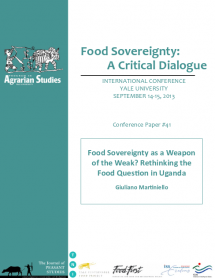Ideas into movement
Boost TNI's work
50 years. Hundreds of social struggles. Countless ideas turned into movement.
Support us as we celebrate our 50th anniversary in 2024.

The new paradigm of food sovereignty offers a series of alternatives to the neoliberal development mode. It also offers some answers to the emerging food question by proposing solutions to reduce dependency on purchased food or aid, focusing on territory, community, autonomy, sustainability, ecology and nutrition.

The food crisis, which is widely connected toboth the ecological and energy crises and exposes the contradictions of the corporate food regime, was manifested in both the deficiency of supply and exponential increase of prices of staple food. Global food crises bring to the fore a number of responses offering inter-linkages between questions of access to food, poverty and power, as well as issues of productivity and the contested debate around technological solutions. The food question in Uganda has been merely interpreted via the modernization paradigm in purely quantitative terms and codified through the notion of food security: the idea that the issue is just one of securing certain availability of food at national and international level through internal production or external aid. The aim of the paper is to debunk the debate from this productivist paradigm, which in Uganda agricultural policies coincides with an emphasis on increasing commercialization of peasant food production. The notion of food sovereignty however cannot be simply read in epiphenomenal terms or merely the lens of contemporary social movements. Indeed it has profound historical, ecological and political articulations with the long-term strategies of peasant households to maintain their relative autonomy, expand their resource base and ensure social reproduction. The paper explores these dynamics through the case of northern Ugandan peasants and their struggles to maintain access to land and food production as crucial instruments to their internal social organization, political authority and economic reproduction. These social struggles are also to maintain their relative autonomy vis a vis states (pre-colonial, colonial and post-colonial) and national and international markets. These dynamics acquire particular relevance in the light of the increasingly unjust, unequal and politically repressive character of the nation state. They are also important because of the overtly central political and economic role played by food in geo-political interstate relations and relations between classes (farmers, peasants and workers) evidenced by amongst other things the current wave of large-scale land acquisitions, which is altering the patterns of food production at global level.
Research Fellow in Political Economy, Makerere Institute of Social Research, Makerere University Martinillo received a PhD in Politics and International Studies from the University of Leeds in June 2011. He has been working on the political economy of land and agrarian change in South Africa in historical perspective. His current research interests include land grabbing, land reforms, food sovereignty and social movements in Africa.
Food Sovereignty: a critical dialogue, 14 - 15 September, New Haven.